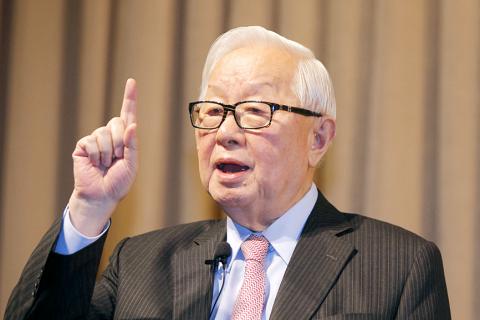Taiwan Semiconductor Manufacturing Co (TSMC, 台積電) yesterday announced that its board has appointed Mark Liu (劉德音) and Wei Che-chia (魏哲家) to succeed 82-year-old Morris Chang (張忠謀) as president and co-chief executive officers.
However, Chang will remain chairman of the world’s biggest contract chipmaker, the company said in a statement.
Liu and Wei are now co-chief operating officers of TSMC, which Chang founded in 1987.

Photo: Ashley Pon / Bloomberg
Chang told investors last month that he would hand over the job of chief executive — which he has done once before — by June of next year, but he would continue to play a “hands-on” role as chairman.
In May 2005, the Hsinchu-based TSMC said Chang would step down as CEO and hand over the reins to then-TSMC president Rick Tsai (蔡力行), who had been with the company for 15 years, with the change to take effect that July.
Four years later, on June 11, 2009, the company announced that Chang would return as CEO, effective the following day, and Tsai would become president of the New Business Development Organization.
At the time, Chang said he saw golden opportunities and serious challenges for TSMC as the global economy was trying to recover from the financial meltdown triggered by the collapse of Lehman Brothers Holdings.
Tsai now heads TSMC Solar Ltd (台積太陽能) and TSMC Solid State Lighting Ltd (台積固態照明).
In yesterday’s statement, TSMC said that Liu and Wei would report to and perform such duties as designated by the chairman of the board, while the finance and legal departments of the corporation would continue to report to the chairman.
In other developments, the company said Woo Been-jon (金平中) was being promoted to vice president of the New Business Development Organization from her current post of director of the department.
It said the board had also approved a revision to TSMC’s “retirement procedure” by setting the mandatory retirement age at 67.
In addition, the board gave the go-ahead for a capital appropriation of US$829.2 million to install, expand and upgrade advanced technology capacity and approved US$178.4 million in research and development capital appropriations and sustaining capital appropriations.
TSMC’s capital spending will hit a record high of US$9.7 billion this year and it is expected to spend about US$10 billion next year.

CHAOS: Iranians took to the streets playing celebratory music after reports of Khamenei’s death on Saturday, while mourners also gathered in Tehran yesterday Iranian Supreme Leader Ayatollah Ali Khamenei was killed in a major attack on Iran launched by Israel and the US, throwing the future of the Islamic republic into doubt and raising the risk of regional instability. Iranian state television and the state-run IRNA news agency announced the 86-year-old’s death early yesterday. US President Donald Trump said it gave Iranians their “greatest chance” to “take back” their country. The announcements came after a joint US and Israeli aerial bombardment that targeted Iranian military and governmental sites. Trump said the “heavy and pinpoint bombing” would continue through the week or as long

TRUST: The KMT said it respected the US’ timing and considerations, and hoped it would continue to honor its commitments to helping Taiwan bolster its defenses and deterrence US President Donald Trump is delaying a multibillion-dollar arms sale to Taiwan to ensure his visit to Beijing is successful, a New York Times report said. The weapons sales package has stalled in the US Department of State, the report said, citing US officials it did not identify. The White House has told agencies not to push forward ahead of Trump’s meeting with Chinese President Xi Jinping (習近平), it said. The two last month held a phone call to discuss trade and geopolitical flashpoints ahead of the summit. Xi raised the Taiwan issue and urged the US to handle arms sales to

State-run CPC Corp, Taiwan (CPC, 台灣中油) yesterday said that it had confirmed on Saturday night with its liquefied natural gas (LNG) and crude oil suppliers that shipments are proceeding as scheduled and that domestic supplies remain unaffected. The CPC yesterday announced the gasoline and diesel prices will rise by NT$0.2 and NT$0.4 per liter, respectively, starting Monday, citing Middle East tensions and blizzards in the eastern United States. CPC also iterated it has been reducing the proportion of crude oil imports from the Middle East and diversifying its supply sources in the past few years in response to geopolitical risks, expanding

Pro-democracy media tycoon Jimmy Lai’s (黎智英) fraud conviction and prison sentence were yesterday overturned by a Hong Kong court, in a surprise legal decision that comes soon after Lai was jailed for 20 years on a separate national security charge. Judges Jeremy Poon (潘兆初), Anthea Pang (彭寶琴) and Derek Pang (彭偉昌) said in the judgement that they allowed the appeal from Lai, and another defendant in the case, to proceed, as a lower court judge had “erred.” “The Court of Appeal gave them leave to appeal against their conviction, allowed their appeals, quashed the convictions and set aside the sentences,” the judges